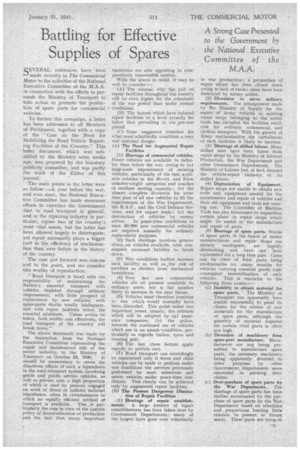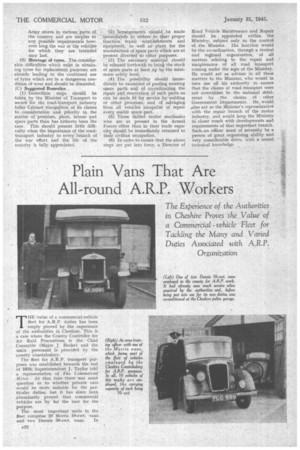Battling for Effective Supplies of Spares
Page 23

Page 24

If you've noticed an error in this article please click here to report it so we can fix it.
SEVERAL references have been made recently in The Commercial Motor to the activities of the National Executive Committee of the M.A.A. in connection with the efforts to persuade the Ministry of Transport to take action to promote the production of spare parts for commercial • vehicles.
To further this campaign, a letter has been addressed to all Members of Parliament, together with a copy of the " Case on the Need for Mobilizing the Road Vehicle Repair ing Facilities of the Country." This latter document, which was sub illitted to the Ministry .some weeks ago, was prepared by the honorary publicity committee, and was partly the work of the Editor of this journal.
The main points in the letter were as follow : —A year before the war, and ever since, the National Executive Committee has made strenuous , efforts to convince the Government that in road transport in general, and in the repairing industry in par
ticular, repose two of the country's most vital assets, but the latter has been allowed largely. to disintegrate; yet repair necessarily plays a bigger part in the efficiency of mechanization than ever before in the history of the country.
The case put forward was concise and to the point, and weconsider this worthy of reproduction.
"Road transport is faced with the responsibility of maintaining the Nation's essential transport with vehicles depleted through 'military impressment, with little prospect of replacement by • new vehicles, with spare-parts stock§ totally inadequate, and with repair facilities below the essential minimum. Unless action .be taken, both swiftly and effectively, the road transport, of the country will break down."
The above statement was made by the deputation from the National Executive Committee 'representing the repair and maintenance side of the motor industry, to the Ministry of
Transport on October 24, 1040._ It
should be unnecessary to stress the disastrous effects of such a breakdown in the road-transport system, involving goods and public service vehicles, as well as private cars, a high proportion of which is used by persons engaged on work of direct or indirect national importance, often in circumstances in
which no equally efficient methOd of
transport is available. This _is partieularly the case in view of the current Toney of decentralization of production and the fact that 'many important businesses are now operating in comparatively inaccessible centres. With the above in mind, it may be well to consider:— (A) The reasons why the call on repair facilities throughout the country will be even higher for the remainder of the war period than under normal conditions.
(B) The factors which have reduced repair facilities to a level actually far below that prevailing in the pre-war period.
(C) Some suggested remedies for what must admittedly constitute a very real national danger.
(A) The Need for Augmented Repair Facilities (1) Shortage of commercial vehicles. Fewer vehicles are available to industry than before the war, owing to (a) large-scale impressment of existing vehicles, particularly of the best available vehicles in the 30-cwt. and 3-ton unladen-weight categories and coaches of medium seating capacity ; (b) the almost complete diversion for some time past of all new vehicles to fill the requirements of the War Department, the R.A.F,, and the Civil Defence Services, and far export trade; (c) the destruction of vehicles by enemy action. In peace-time conditions at least 40,000 new conimercial vehicles are required annually for ordinary replacement purposes.
(2) Such shortage involves greater strain on vehicles available, with consequent increased liability to break down.
(3) War conditions further increase such liability as well as the risk of accident as distinct from mechanical breakdown.
(4) Very ,few new commercial vehicles are atpresent available to ordinary users, nor is the number likely to increase in the near future.
(5) Vehicles must therefore continue to run which would normally have, been, discarded. This point raises two important issues, namely, the attitude which will be adopted by -(a) insurance companies, (b) the police, towards the continued use of vehicles which are in an unsafe-condition, particularly as regards brakes, tyres and steering gear.
(6) The last three factors apply equally to private cars.
(7) Road transport can accordingly be maintained only if fewer and older vehicles, can be made to perform under war Conditions the services previously performed by more numerous and newer vehicles under peace-time conditions. This clearly can be achieved only by augmented repair facilities.
(B) The Present Dangerous Diminu. tion of Repair Facilities (1) Shortage of repair establishments. A large number of repair establishments has been taken over by Government Departments; many of the largest have gone over voluntarily
to war production; aproportion of repair 'shops has been closed down owing to lack of trade; some have been destroyed by enemy action.
(2) Diversion to serve military requirements. The arrangement made by The Ministry of Supply for the repair of Army vehicles in existing repair shops belonging to the motor trade has curtailed the facilities available for ordinary commercial, and civilian transport. With the growth of Army mechanization the curtailment of such facilities is likely to increase.
(3) .Shortage of skilled labour. Many skilled men have been taken from repair shops by the Ministry of Aircraft Production, the War Department and other Government Departments. The Ministry of Labour has, in fact, drained the vehicle-repair industry, of its skilled labour.
(4) Depreciation of Equipment. Repair shops are unable to obtain new tools and equipment needed for the maintenance and repair of vehicles and their old equipment and tools -are wearing out. The Controller of Machine Tools has also threatened to requisition certain plant in repair shops which might be useful in the manufaeture and repair of parts.
(5) Shortage of spare parts. Stocks of spare parts lit the hands of motor manufacturers and repair shops are already inadequate, are rapidly diminishing and have not been replenished for a long time past. Cases can be cited of bital parts being' unobtainable for many months for vehicles carrying essential goods with consequent immobilization of such vehicles. This is traceable to the follczwing three causes :— (a) Inability to obtain material for • spare parts. The Ministry of Transport has apparently been unable successfully to press its claims for the release of raw materials for the manufacture of spare parts, although the quantity of material required for certain vital parts is often not high.
(b) Diversion of machinery from
spare-part manufacture. Manufacturers are not being per
mitted to manufacture spare parts, the necessary machinery being apparently diverted to other purposes by other Government Departments more successful in pressing their claims.
(c) Over-purchase of spare parts by the War Department. The shortage of spare parts has been further accentuated by the purchase of spare parts by the War Department based on schedules and proportions bearing little relation to present or future needs. These parts are lyingat Army stores in various parts of the country and are surplus to any possible requirements how. ever long the war or th,e vehicles for which they are intended may last.
(6) Shortage of tyres. The,considerable difficulties which exist in obtaining tyres for replacement purposes are already leading to the continued use of tyres which are in a. dangerous condition of wear and should be discarded.
(C) Suggested Remedies (1) Immediate steps should be taken by the Minister of Transport to secure for the road-transport industry fuller Cabinet recognition of its claims to consideration and priority in the matter of 'premises, plant, labour and spare parts than has hitherto been the case. This should present little difficulty when the importance of the roadtransport industry to every branch of the war effort and the life of the country is fully appreciated. (2) Arrangements should be made inneediatery to restore to their proper function repair establiShments and equipment, as well aS plant for the manufacture of spare parts which are at present diverted to other purposes. • (3) The necessary material should' be released forthwith to brink the stock of spare parts at least up tp the minimum safety level.
(4) The possibility should immediately be examined of pooling existing spare parts and of co-ordinating the repair a.nd renovation of such parts as can be made fit for service by welding or other processes, and of salvaging• from all vehicles incapable of repair every usable spare part.
(5) Those skilled motor mechanics who are at present in the Armed Forces 'other than in their trade capacity should be immediately returned to their civilian occupation.
(6) In order to ensure that the above steps are put into force, a Director of Road Vehicle Maintenance and Repair should be appointed within the Ministry, subject only to the control of the Minister. His function would be the co-ordination, through a central and regional organization, of all matters relating to the repair and maintenance of all road transport coming under the wgis of the Ministry. He would act as adviser in all these matters to the Minister, who would in turn use all his authority to ensure that the claims of road transport were not overridden to the national detriment by the claims of other Government Departments. He. would also act as the Minister's representative with the repair branch of the motor industry, and would keep the Ministry in closer touch with developments and requirements of that important branch. Such. an officer must of necessity be a person of great organizing ability and very considerable drive, with a sound technical knowledge.




















































